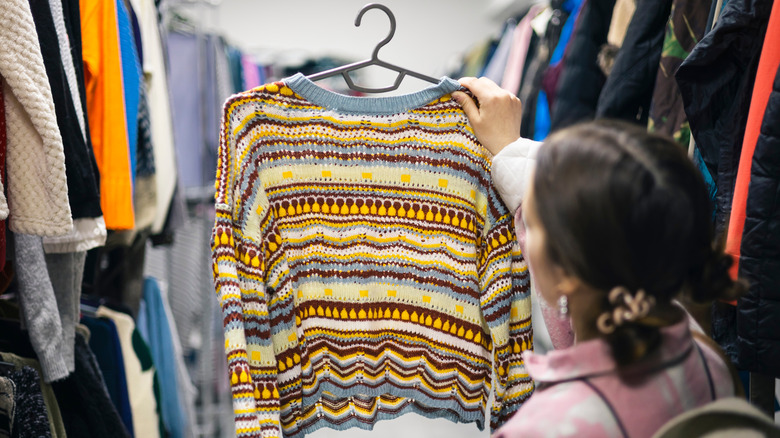Consignment Vs. Thrift Stores: Both Are Treasure Troves, But Here's What Sets Them Apart
There's honestly nothing better than finding a great deal on gently used clothing and other household items, but when it comes to thrifting, there are several types of shops to choose from. Consignment shops focus more on high-end items, and will often have higher prices as a result. Pricing is one of the key differences between consignment shops and thrift stores, as is the process by which items are acquired for the stores.
Consignment stores are stocked with items that still belong to the original owner — they're a type of resale shop that lets individuals bring in their clothing and household items and then pays them after the item sells. Consignment shops are often particular about the types of items they make room for — they'll tend to focus on items that are name-brand and in like-new condition. This is because they want items that will generate revenue for both the consigner and the consignee. Some resale shops work similarly to consignment stores, but they buy the items outright — like Plato's Closet. Either way, you get to try to make some money back on the clothing or other household items you no longer use, without having to sell them on your own online or at a rummage sale. Plus, if you have some valuable items people look for at the thrift store, you may want to consider consigning instead of donating.
So, what is a thrift store?
Thrift stores, on the other hand, receive donated items. Once the customer drops off the donations, they become the store's property. Thrift stores, depending on the store, often put out anything donated to them as long as it's in decent shape, regardless of brand. Some thrift stores put out everything — even items with stains and holes — while others conduct very rigorous inspections to ensure everything tagged for sale is in wearable condition.
Many thrift stores are affiliated with a charity, such as Goodwill and The Salvation Army. Much of the money they make goes to help people. When you donate to these types of thrift stores, while you may not get direct cash for your items, you can get a donation slip to use as a write-off at tax time. It used to be that charity thrift stores were the more affordable option over consignment stores, but these days, the prices seem to be high no matter where you shop. Prices aside, both of these shopping options are a great way to practice sustainability, whether you're buying, selling, or donating. Secondhand stores are an excellent choice for saving money on home renovations, clothing, books, and so much more. Though there are some things you should never buy at the thrift store, such as used mattresses or baby products; these are good to keep in mind when donating as well.

